By: priyam nayak
June 2 2023
PCOS & endometriosis: Misinformation is making it harder for patients seeking treatment

The YouTube account of Aasha Ayurveda, an Ayurvedic clinic that has branches nationwide, posted a video testimonial of a woman claiming the clinic treated her endometriosis - a chronic disease in which tissue similar to the lining of the uterus grows outside it.
The woman narrates that allopathic treatment at the renowned AIIMS hospital in New Delhi entailed consuming tablets for six months, and she was told the cyst can only be removed surgically. “I am 27 years old and unmarried. I was worried a surgery might cause future complications; what if my partner did not accept it?” the woman says.
Claiming Ayurvedic treatment helped her get rid of the disease completely, she urges other patients to follow a similar route. Posted on April 29, 2020, the video has over 71k views, and the channel has 76.2k subscribers.
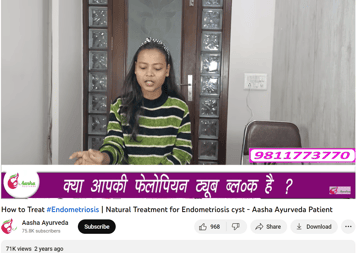
Source: Asha Ayurveda/YouTube
"Patients think there is no harm in trying such cures because they are inexpensive and easily available. Surgery is expensive, and nobody wants to undergo surgery unless they absolutely need to. Patients lap up claims of curing endometriosis that they see on social media," gynecologist Dr. Abhishek Mangeshikar told Logically Facts.
Similarly, in a video posted three years ago, the 'Fit Tuber' channel on YouTube claims six simple steps based on Ayurveda can completely cure Polycystic Ovary Syndrome (PCOS). With a whopping 7.02 million subscribers, run by content creator Vivek Mittal, one step included sitting in the moonlight for 15 minutes every night and drinking 'moonlight-charged' water by keeping a glass exposed to the moon's light and drinking it the following day. The video has 5.3 million views and more than 11k comments.
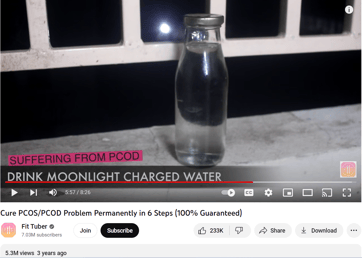
Source: Fit Tuber/YouTube
PCOS is a common hormonal disorder affecting women of reproductive age. It is a lifelong health condition wherein tiny fluid-filled sacs develop on the ovary due to hormonal imbalances. While PCOS cannot be cured, the symptoms can be managed with various treatment options like lifestyle changes, hormonal birth control pills, fertility treatments, and surgery in some rare cases.
But misinformation about endometriosis and PCOS on social media taps into the fear of surgeries and false hopes of 100 percent recovery. Misleading claims about natural and Ayurvedic cures are rampant on Instagram, Facebook, and YouTube, often accompanied by promises of enhanced chances of conception for women.
PCOS misinformation amplified: From celebrity endorsements to influencers
The Instagram handle of Ayurvedic supplements brand Gynoveda has 145k followers and aggressive online advertising with Bollywood actor Taapsee Pannu as ambassador.
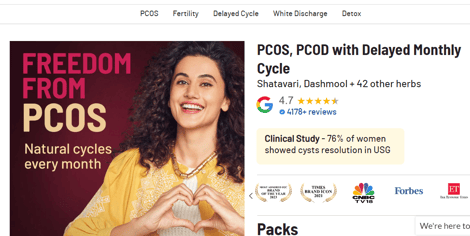
Source: Gynoveda’s official website
Gynoveda has an extensive repertoire of products - from capsules claiming "freedom from PCOS" to fertility support Ayurvedic tablets. They even have a section on the website dedicated to "intimate health," under which a product claims to "reduce watery, milky, thick, yellowish discharge before & after (menstrual) cycle."
For all the products listed on the Gynoveda website, there is a list of Ayurvedic herbs used as ingredients. A logo that says 'FDA Approved' can be seen next to this list. It is possible to make the inference that the American Food and Drug Administration approves the company's products, but Google results lead to the company's blog which states, "All Gynoveda medicines are approved by Food & Drugs Administration of Ayurveda. This certification is awarded to Gynoveda after stringent scrutiny of safety standards to formulate the Ayurvedic Proprietary Medicines."

Source: Screenshot from Gynoveda’s website showing ‘FDA approval’
Logically Facts could only find the mention of the Food and Drug Administration of Ayurveda on one other blog promoting Gynoveda.
However, a government body with a similar name exists. The Food and Drug Control Administration of the Gujarat government's health and family welfare department provides licenses for Ayurvedic drug manufacturing. But it is unclear if this particular body has licensed Gynoveda's products. The company recently raised $10M in Series A funding led by India Alternatives Fund and Wipro Consumer Care - Ventures.
Logically Facts reached out to Gynoveda and will update this piece if we receive a response.
Dr. Esha Chainani, founder of Premaa, an app for pregnant women, and Mumbai-based gynecologist, told Logically Facts that the positioning of supplements as a cure for PCOS is rooted in deep mistrust for western medicines that a chunk of the population has.
"Alternative systems of medicines wrongly posit a one-size fits all approach. How can the same pill or tonic cure infertility, thyroid, insulin resistance, depression, and anxiety that stems from PCOS? Just because it is natural doesn't mean it is good for you. Many of these supplements are untested and can contain heavy metals like arsenic and cadmium, which can cause other serious health problems in the long run," she told Logically Facts.
Misinformation runs amok on Instagram
On Instagram, a quick search of PCOS-related hashtags such as #pcosIndia, #curepcosnaturally, #pcosIndiandiet, and #freedomfrompcos reveals a deluge of misleading content. From infographics to PCOS-friendly recipes and outright false claims about safe ways to 'cure' or 'reverse' the condition, these Instagram posts can falsely create the impression that managing the condition is possible simply by following a particular diet regime and popping supplements.
"A PCOS patient once came to me. She was overweight, and she had bought fat burner pills from Instagram. After the consultation, it became clear that the supplements had caused liver damage. Unfortunately, I get so many PCOS patients every day who have fallen prey to claims like these on social media only to end up worsening their condition or triggering other health problems," Chainani said.
-png.png?width=420&height=181&name=Screenshot%20(57)-png.png)
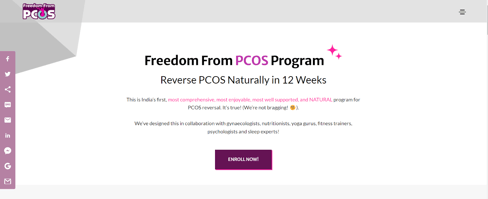
Source: Freedom from PCOS/Instagram, Freedom from PCOS official page
Similarly, many influencers routinely claim PCOS can be fixed naturally. The content of the ‘Freedom From PCOS’ page is centered around tips, tricks, and suggestions for women to deal with different aspects of PCOS. The page has over 6,000 followers on Instagram, with a significant thrust on avoiding medicines.
The program on the website claims that PCOS can be reversed naturally and easily. The program claims to reverse PCOS in 12 weeks and is run by experts, including a gynecologist, a life coach, fitness trainers, and yoga and meditation experts.
The Facebook page of Freedom From PCOS has 33k likes and 38k followers, and the program is run by Aarti Pandey, who claims to be an “Expert in reversing PCOS naturally” on LinkedIn. There are no licenses or certifications to indicate she has the requisite experience or knowledge to advise or treat PCOS patients.
“I have more than 1,000 success stories of women reversing their PCOS naturally,” Aarti told Logically Facts. “How do I claim this? Well, I have a panel of doctors - gynecologists, psychologists, yoga experts, and trainers who have worked together and created the five pillars which help women balance their hormones & reverse PCOS naturally. I have done my ACSM - American College of Sports Medicine & invested more than three years in researching & curating the protocols.”
One of the panel of experts on Pandey’s page is a doctor who claims not to prescribe “even a tablet of paracetamol” - a standard pain management method. Additionally, PCOS can be managed but not reversed, according to experts and studies.
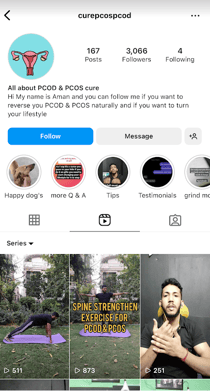
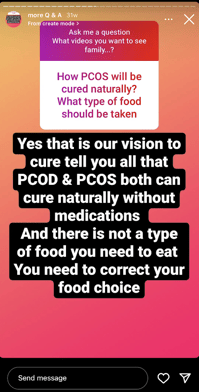
Source: Instagram account of ‘curepcospcod’
The account owner of the above account frequently posts exercises and yoga poses that target different body parts, claiming they can alleviate symptoms for PCOS patients. However, he often posts misleading claims about the dangers of birth control pills commonly prescribed by doctors to manage PCOS to patients who don’t want to get pregnant. The owner’s credentials are not mentioned in the bio or any posts.
The fallacious focus on fertility and societal acceptance in the treatment of endometriosis
The following screenshot is from a video posted by an Ayurvedic doctor who has 8.7k subscribers on YouTube. The video was posted two years ago and has 24k views. She explains surgery is never the cure for endometriosis; the only treatment is maintaining hormonal balance. She claims that two Ayurvedic medicines by the name of ‘Varanadi Kashayam’ and ‘Kanchanar Guggulu’ can be taken by endometriosis patients because these herbs can shrink endometriotic cysts naturally.
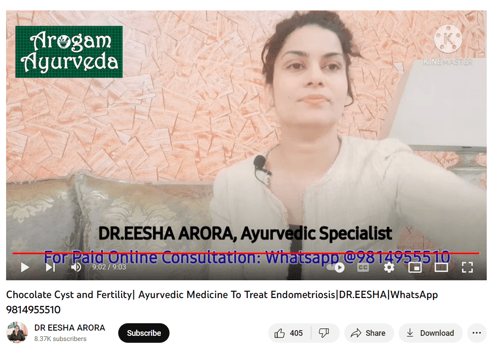
Source: DR. EESHA ARORA/YouTube
Hepatologist Dr. Abby Phillips, popularly known as LiverDoc on Twitter said, “guggulu products have shown serious concern,” citing a report by The Ken that narrated accounts of how patients using herbal drugs developed herb-induced liver injury leading to cirrhosis and chronic arsenic poisoning among other conditions.
Endometrial growths (called implants) can bleed and become inflamed and cause scar tissue to form in the pelvic region. They can also spread to other organs leading to organ damage. Endometriosis can cause excruciating pelvic pain during and before menstrual cycles, and some patients also feel pain during sexual intercourse and urination.
Like PCOS, dubious claims are widespread on social media about endometriosis. Videos like the ones mentioned above that make false claims about the causes, treatment, and cures are becoming increasingly common. According to the World Health Organization, the cause of endometriosis is unknown, with no prevention methods or cures. Medicines and sometimes surgery can treat the symptoms.
Mangeshikar says, “In India, unfortunately, the discourse on endometriosis is only limited to infertility. Pain is rarely discussed, which is about 80 percent of what endometriosis is all about. Infertility or sub-fertility is a very small factor in endometriosis. Only 30-40 percent of endometriosis patients have difficulty conceiving, and the rest can conceive naturally provided their hormonal profiles are normal.”
Negligence about the complexities of the disease in the medical community also leads to mismanagement and patients suffering for many years. For instance, many patients are advised by doctors to try to get pregnant.
Mangeshikar concurred that while pregnancy can temporarily suppress symptoms, the possibility of symptoms flaring after patients have given birth and stopped breastfeeding is high.
Regardless, the notion has become a convenient narrative widely peddled by IVF clinics and practitioners of alternative systems of medicine.
In India’s pronatalist society, where there is an unwillingness and lack of awareness to address the male factor infertility, narratives like these can wrongfully set patients on the path of IVF and other treatments that do not address the root cause.
Mangeshikar said, “A while ago, a couple had consulted me as the wife had endometriosis. Both were doctors, and the lady had undergone three failed IVF cycles even though she wasn’t keen on conceiving because she was told that getting pregnant was the only way to cure the disease. There is ample research to indicate that removing the disease not only alleviates pain but with natural pregnancy and improves IVF outcomes.”
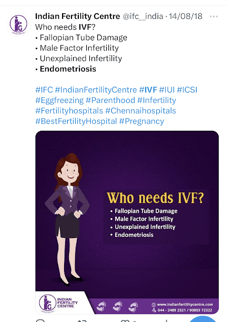
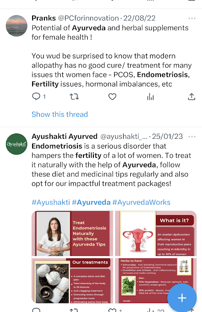
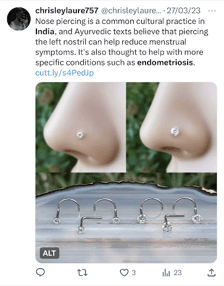
Twitter screenshots of claims on endometriosis
A broken system aids misunderstanding
Kriti Arora (name changed) is 27 years old and underwent surgery in 2021 for endometriosis. She narrates, "Everyone told me that my period pain was normal. I would writhe in pain for three days straight. I would pop 2-3 painkillers daily, and the excruciating pain and nausea would render me incapable of doing anything. I visited seven doctors before I got a correct diagnosis. Until then, I was labeled a hypochondriac and an attention seeker for trying to decipher why my periods left me bedridden for days."
Due to a lack of awareness about the disease and the misconception that severe period pain is normal, patients either shy away from seeking appropriate medical care or remain unaware until the disease manifests itself in ways other than menstrual pain.
Lack of scientific research on endometriosis and the negligence prevalent in the medical community catalyzes the spread of erroneous information. A 2019 American Journal of Obstetrics and Gynecology (AJOG) review stated, "Despite its high prevalence and cost, endometriosis remains underfunded and under-researched, greatly limiting our understanding of the disease and slowing much-needed innovation in diagnostic and treatment options." In addition, the diagnostic delay in the diagnosis of endometriosis is reported to be seven to nine years globally.
"In residency training for medical students, only one chapter is dedicated to endometriosis," Mageshikhar said. "In medical college, we're told endometriosis is when the endometrial tissue is thrown back into the abdomen and starts growing and producing blood. But that is completely wrong. There are many variants of endometriosis."
Arora recalls that when she was finally diagnosed and recommended surgery, her family members urged her to try homeopathy and Ayurveda. "My mother was worried that the surgery would result in complications and hamper my chances of conception," she told Logically Facts. "My mother who is quite active on social media, told me to consult a dietitian she found on Instagram. The latter had put up a reel on how one of her clients could shrink the size of her cyst after following her diet plan. I was told to tell people in our extended family that I underwent surgery for appendicitis and not endometriosis."
Widespread talk on women's health online: A blessing or a curse?
In recent years, social media has provided women a window through which they have been able to enhance their knowledge about reproductive health issues and find support in online spaces. In addition, advocacy groups and organizations have also tapped into the power of social media to reach a wider audience with credible information about the symptoms and treatment options. This has set in motion a much-needed dialogue about the challenges of living with PCOS and endometriosis.
The downside to this upsurge in conversations about the disease, though, is the proliferation of content that is misleading and dangerous with the potential to cause harm to those suffering from it. Misinformation is linked to numerous factors including the fascination for alternative medicines, mistrust of western medicine, the commodification of the disease, and the stigma that shadows conditions affecting women's reproductive health.
Dr. Vimee Bindra Basu, an endometriosis excision specialist at Apollo Health City Hyderabad asserts that the stigma runs so deep that even after consulting specialists, patients and their families refuse to seek the right method of treatment. "These cures advertised on social media distract patients and we have often seen cases where they start taking supplements of their own accord or refuse to undergo surgery thinking they will be cured by them."
Widespread awareness-building on such conditions and responsible consumption through media literacy and accountability by influencers will play key roles. "Women who may not be privy to the nuances of surfing the internet safely are at greater risk because these claims can set them on a harmful path that can adversely impact their health. The desire for secrecy due to the stigma around these diseases can entrap them in a vicious cycle of suffering and disappointments," Basu said.
Perhaps the Indian government's recent mandate that may soon make influencers disclose their qualifications when discussing health and wellness will be a catalyst for limiting misinformation.
(Edited by Ilma Hasan)


